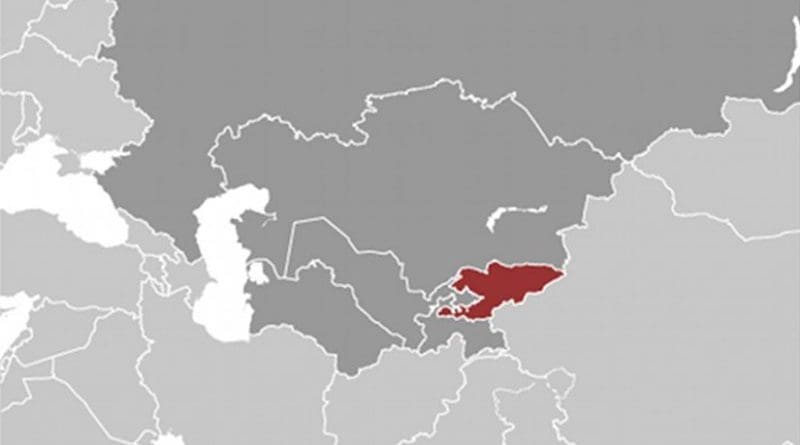Bishkek Fears Russia Wants A Protectorate Over Kyrgyzstan – OpEd
By Paul Goble
Continuing violence in Kyrgyzstan, especially in the south, and Russian moves that some in Bishkek see as intended to discredit the Provisional Government have prompted some in Kyrgyzstan and elsewhere to speculate that Russia wants to establish a protectorate over Kyrgyzstan in order to restore order.
But according to an analysis posted online in Moscow today, the Russian government is extremely reluctant to move in that direction, having been chastened by the costs financial and political of its recognition of and assumption of responsibility for Abkhazia and South Ossetia after the August 2008 war with Georgia.
Writing for Stoletiye.ru, Aleksandr Shustov, a frequent commentator on Central Asia, says that increasing violence in Kyrgyzstan has “increased concerns about the possibility of the introduction of ‘external rule’ or ‘a protectorate’” by Russia or some combination of powers (www.stoletie.ru/rossiya_i_mir/moskve_navazyvajut_protektorat_nad_kirgizijej_2010-05-20.htm).
The Moscow analyst suggests that people who were part of the former Kyrgyzstan government have as their “tactical goal” the “seizure of power in three southern oblasts which they to all appearances in the case of irresoluteness or slowness on the part of the Provisional Government, they count on holding.”
The “strategic” goal of these people, Shustov continues, citing media reports, is the maintenance of control over economic interests so that they can play this “card” in future relations with Bishkek regardless of whether it succeeds in stabilizing the situation or ultimately fails to do so.
Toward those ends, the Russian commentator says, “the opponents of the Provisional Government are attempting to use [the latter’s] lack of legitimacy and consequently the shaky legal status of the governors it has assigned in the southern regions,” as well as discontent among non-Kyrgyz nationalities, Islamist radicals, and criminal groups with ties to the drug trade.
Two days ago, Azimbek Beknazarov, the vice president of the Provisional Government who has been tracking developments in the south, said that “we are predicting the third wave of the counter-revolution in Kyrgyzstan,” a prediction that the clashes between Kyrgyz and Uzbek groups in Jalal-Abad yesterday appears to confirm.
According to the Provisional Government leader, “the next attempt at destabilization of the situation will be undertaken on an inter-ethnic basis,” with the regime’s opponents seeking to exploit ethnic tensions between Kyrgyz and Uzbeks in the south. The events of the last 24 hours suggest his prediction was accurate.
But because of this instability, Shustov continues, rumors are circulating in Bishkek “about the possible introduction of “foreign rule’ or a protectorate which Russia and Kazakhstan may establish.” These rumors have been sparked by the appointment of Vladimir Rushaylo, the former Russian interior minister, as special representative of Moscow and Astana.
Moreover, as Elmira Nogoybayeva, the head of the Kyrgyz Polis Asia Analytic Center has noted, “there has been a consistent campaign in the mass media of Kazakhstan and Russia aimed at discrediting the image of Kyrgyzstan, all the more so after the Provisional Government announced a draft constitution calling for a parliamentary form of government.
Such a regime if established would by its very nature, she argued, represent a challenge to the authoritarian presidential regimes in both Kazakhstan and the Russian Federation. But criticism of Bishkek’s plans, she insisted, represents “crude interference in the internal affairs of sovereign Kyrgyzstan.”
According to Shustov, “the idea of introducing a Russian protectorate in Kyrgyzstan came from beyond the ocean” in an analysis prepared by Nikolay Zlobin of the Washington Institute of World Security. The Russian-American analyst suggested that a protectorate might be the only way to save the situation and prevent an unwelcome Chinese intervention. .
But according to Shustov, this idea does not currently enjoy “particular enthusiasm” either in Kyrgyzstan where it might lead to the extinction of independence or in Russia where it would mean the assumption by Moscow of “all responsibility for the situation” in that Central Asian republic.
People in Moscow have not forgotten the enormous expenses it assumed and continues to pay for in South Ossetia and Abkhazia, and they know that “support of the much larger and more populous Kyrgyzstan, a republic without a common border with Russia would require much greater expenditures.”
But even more important, any such Russian move would not only force Russia to use its own forces to control the situation but could trigger a new outburst of hostility toward Moscow much as the August 2008 war in Georgia did. And consequently, Shustov concludes, it is “not accidental” that Rushaylo has insisted that he “does not intend” to interfere in Kyrgyz affairs.

